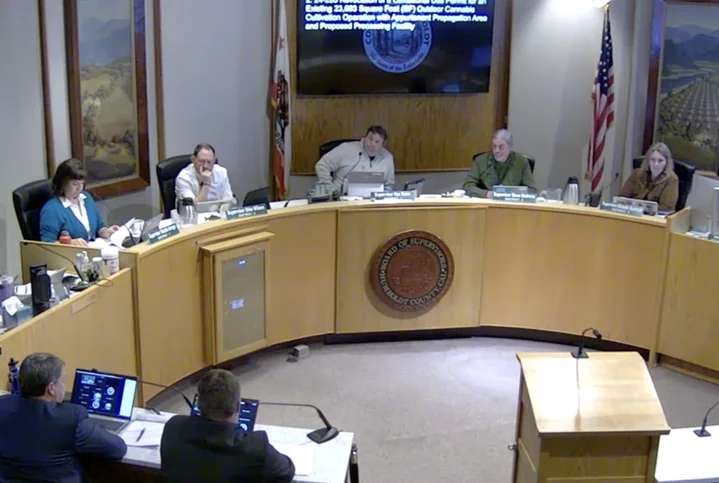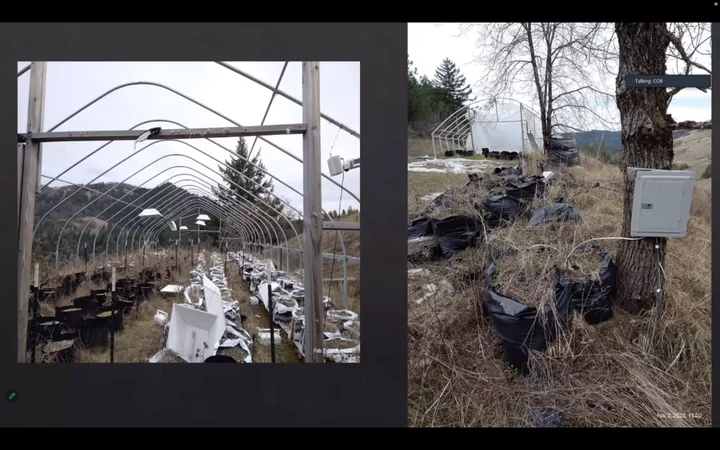Your Humboldt County Board of Supervisors (from left): Natalie Arroyo, Mike Wilson, Rex Bohn, Steve Madrone and Michelle Bushnell. | Screenshot.
###
Here we are again, Humboldt.
Like the fishing and timber industries that preceded it, the local cannabis-based economy has, by all accounts, fallen prey to the predictable boom-and-bust cycle of resource extraction. Factor in overproduction in the statewide marketplace and a still-thriving black market and voilà: the storied local weed industry finds itself squarely in “bust” mode.
Witness today’s Board of Supervisors meeting, during which the board unanimously revoked a pair of cultivation permits issued to growers who appear to have abandoned their farms, leaving behind illegal water diversions, un-permitted infrastructure, environmental degradation and thousands of dollars in unpaid taxes and fees.
Even with the specter of Measure A apparently in the rear-view, Third District Supervisor Mike Wilson said he expects this type of thing to continue.
“I think what we’re gonna really be dealing with here in the future is the environmental impacts of contraction, not expansion,” he said with relationship to the industry.
Both of the permits revoked at today’s meeting were for grows of a little over half an acre. For the first one, Planner Joshua Dorris presented a history of the site, located north of Honeydew off the Mattole Road. Dorris said the applicant started growing without a state license and without completing the conditions of approval for a permit from the county.
In September, the California Department of Fish and Wildlife served a search warrant to the property, and staff located 1,069 growing cannabis plants in two greenhouses, plus 28 pounds of processed cannabis and multiple violations of agency code. Notices were sent and posted to the property without reply.
However, the applicant, Evan Kouchalakos, called in today to argue that there had been a misunderstanding. He said it was the previous property owner who illegally diverted water, and that a consultant he’d hired was supposed to have paid the state licensing fee but never did.
“Our intention was never to not comply to everything,” Kouchalakos said. He added that the board “has every right to take action,” but he asked them to suspend his license rather than revoke it so he could resolve the various issues.
“I never intended to break the law,” he said.
The board couldn’t be swayed, though. First District Supervisor and Board Chair Rex Bohn said there had been plenty of correspondence giving him a chance to address these outstanding matters.
Fourth District Supervisor Natalie Arroyo said she finds the illegal water diversion “deeply problematic,” and she addressed the economic implications of such rule-flouting grow ops.
“I couldn’t in good conscience support the continuation of this permit given that, essentially, without being state-licensed, this product is what’s undercutting the market for those who have complied with the rules,” she said.
Third District Supervisor Mike Wilson agreed, though he pointed out that revoking permits will inevitably lead to unpaid bills and unaddressed environmental issues.
“If the [cultivation] sites no longer have the ability to generate revenue, there isn’t anything to pay for that cleanup,” he said, “and it devalues those properties to such an extent that we’re gonna see more and more abandonments.”
Suggesting that today’s hearings may be a “harbinger” of things to come, Wilson said that anyone who drives around the county can see evidence of the severe contraction in the industry, from abandoned hoop houses to unmaintained roads and vacant farm sites.
Screenshot from a staff report showing an abandoned hoop house with deteriorating grow bags and illegal wiring.
###
The second permit revocation of the day was an example of just that: an abandoned grow operation along Hwy. 36 near Bridgeville. Associate Planner Michael Kein showed the board a series of photos taken during inspections in 2022 and 2023, which found discarded lighting ballasts, plastic sheeting, construction materials, used soil, trellis materials and household items, plus several non-operational vehicles on the property.
The associated applicant failed to meet the conditions of approval for their permit, and Kein said they owe more than $4,000 to the Planning and Building Department, plus about $17,000 in unpaid Measure S cultivation taxes.
Second District Supervisor Michelle Bushnell asked Planning and Building Director John Ford whether the applicant had made any arrangements to pay those bills. Bohn responded by asking whether the applicant was online or in the audience. When there was no reply he said, “There’s your answer.”
At one point, Fifth District Supervisor Steve Madrone suggested that out-of-business weed growers now have the opportunity to generate income “through what has always been the tradition, and that is forest management.” He noted that the value of Douglas fir, redwood and other species is “quite high” right now.
Bohn was skeptical, saying the majority of these parcels have no marketable timber on them.
Addressing the matter of unpaid fees and taxes, Madrone asked whether a lien could be placed on properties like this one. Ford said the county can’t issue liens for unpaid fees. “So that [bill] goes to collections and probably would never be paid,” he said.
But Ford said the county has worked with a firm that facilitates receiverships of such properties, explaining that a receiver will take control of a property, clean it up and sell it, receiving the benefits of that labor while abating environmental issues.
Arroyo later said she’s interested in exploring that process further. Ford indicated that staff will embark on that mission and bring something back to the board at a later date.
Wilson, meanwhile, floated the notion of a tax — or perhaps a diversion of taxes collected in property resales — with revenues funding cleanups.
Ultimately, as noted above, the board voted unanimously to revoke both permits.
###
What else happened:
- The board was scheduled to consider establishing a Private Land Intentional Community Shelter Program, which would address homelessness by allowing private property owners to rent out space to transient community members seeking temporary living arrangements. A couple of residents from the oft-discussed “Yee Haw” communal living property near Trinidad called in to advocate for such a program. However, the agenda item was pulled, apparently to be discussed at a future meeting.
- After hearing testimony from a number of local veterans, the board agreed to increase the stipends it provides to three of the five county-owned Veterans Memorial Halls in Humboldt, those located in Arcata, Fortuna and Ferndale. The stipends are intended to offset utility payments, but veterans groups say those payments — the product of a decades-old agreement — don’t come close to covering their actual costs. Wilson voiced concern about inefficient energy systems in these old buildings. Bohn lamented the time it takes to get heating systems fixed. Arroyo said she’d work with the Redwood Community Energy Authority staff to explore possible solutions.
- The board unanimously approved the county latest strategic plan, which covers the timespan of 2024 through 2028. The board had been working on the plan for the past year, with Arroyo and Wilson comprising a working group that met with department heads. The plan is considered a guiding document and a tool that “sets the tone and direction” for the entire organization while ensuring that the county works “toward addressing the community’s needs with the resources available,” according to a staff report. You can download a pdf of the colorful 22-page document by clicking here.


CLICK TO MANAGE